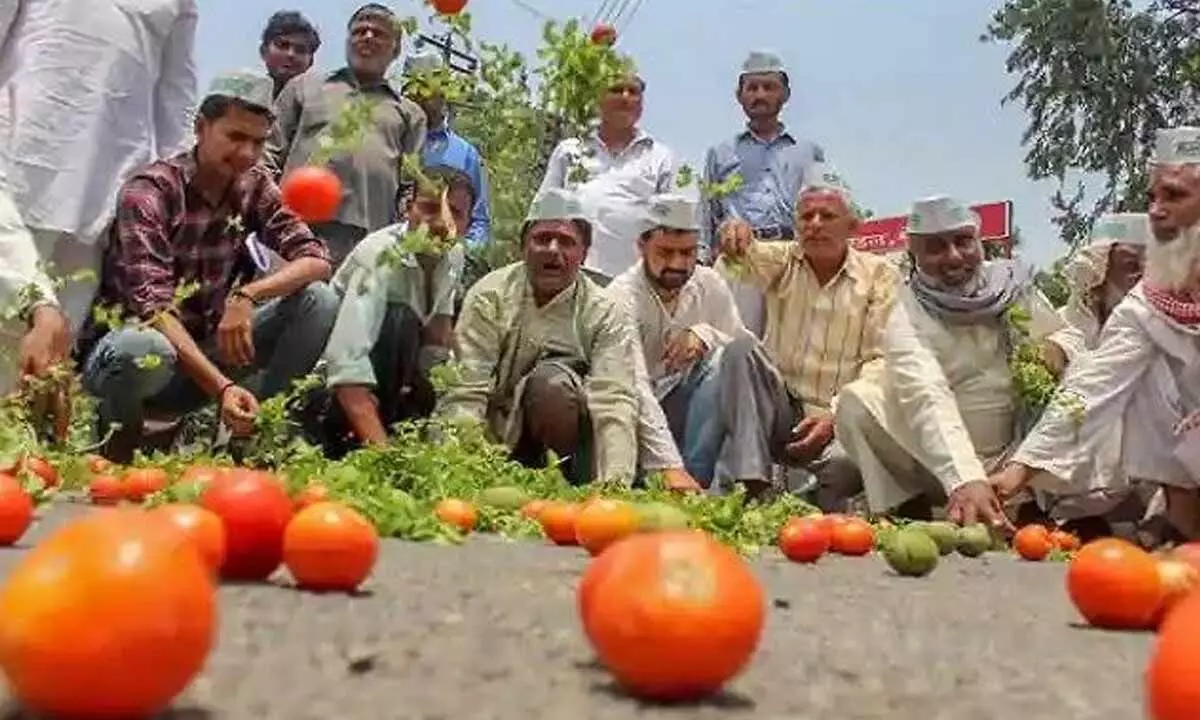Farmers continue to get pittance

Farmers continue to get pittance
Even organised retail chains fails to eliminate middlemen and pass on benefit to farmers
On a TV discussion the other day, I said that it was appalling to see the price difference between the price that onion farmers are able to fetch in the wholesale market, at Rs 2 to Rs 3 per kg, and what the retail traders make selling the same produce for Rs 20 to Rs 30 per kg depending on the location. In other words, the price difference between the wholesale and the retail market is at least 900 per cent!
In February, when cauliflower was being sold in Punjab in the retail market at Rs 20 per kg, farmers were getting not more than Rs 2 per kg. This again showed a price difference of almost 900 per cent. According to news reports, during the same month, potato prices for the farmers had come down to Rs 4 to Rs 6 per kg, and the retail price had still remained consistent at Rs 20 per kg. Apparently, trade was clearly making a huge profit.
A few weeks back, capsicum was priced in the retail market at Rs 30 per kg. This is what the retail trade was charging from the gullible consumers when capsicum was being literally dumped on the streets by irate farmers. With farmers being
offered Rs 15 for a bag of 17 kg of capsicum, the wholesalers were not willing to
offer a higher price. And with no let down in retail prices, the trade walked away with a commission of 2,900 per cent.
Not only with tomato, onion and potato (TOP is the acronym for this group of veggies), the story of other vegetables like garlic, ginger, cauliflower, cabbage, bhindi, brinjal, capsicum and lettuce, to name a few, too is not very different. Rarely have the consumer prices been in close proximity with the farm gate prices. For several years now, I have kept track of the trade and my observation is that not only during a price crash for farmers, the commission that trade extracts even at normal times is also exceptionally high.
What we measure as food inflation and the general thinking is that it is because of the higher prices farmers get, but in reality it is driven by the seller’s profit. The price consumer pays the exploitative commission that retail walks away with. After all, how can the trade justify a commission margin of 900 per cent and in exceptional cases the margin even exceeding 2,900 per cent?
Whenever reports of farmers throwing their harvest on the streets appear in the media, quite a large section of the social media handles want the farmers to take the blame. The argument they come up with, which is not different from the claims of agribusiness, is that if the farmers had not forced the government to withdraw the three contentious farm laws, they would have got a better price. Some even go to the extent of saying that the three laws could have turned agriculture into profitable propositions.
The same arguments were made when the entry of organised retail was being debated. The organised retail will eliminate middlemen thereby providing a higher price to farmers and sell it at a decent price to consumers and in the process plugging exploitation on both sides. But it didn’t happen. For instance when prices of onions, garlic or capsicum crashed in the wholesale, I didn’t see any appreciable decline in the consumer prices in the supermarket stores. Please do correct me whenever you see organised retail providing a price advantage to consumers when farm gate prices are low. I am aware there are quality issues, but that alone is not the factor to drive up the consumer prices by a few hundred per cent.
The point I am trying to make is that the commission margin hasn’t come down for the companies, which have always claimed that they eat away the multitude layers of middlemen in the supply chain thereby reducing the consumer prices.
Food inflation in other words has traditionally been bitten by the profit bug. Call it ‘greedflation,’ the retail prices for especially the horticultural produce, hides the huge margins the middlemen extract. But whenever we hear of food inflation inching up, the general impression is that it is because of higher prices farmers are getting. In reality it is not so. While veggies prices hover at almost the same level, it is the exorbitant trade margins that add to the inflationary figures.
My suggestion would be to open up for collaborative efforts to encourage agro-ecological farming systems, learning from the enormous leadership being demonstrated by Community-based Natural Farming Systems from Andhra Pradesh. The state has already converted eight lakh farmers from chemically harmful to non-chemical farming systems.
Similarly in India, a stern enforcement of regulations are necessary to ensure that the exploitative trade margins between wholesale and retail trade are reduced to reasonable and acceptable limits.
The Reserve Bank of India (RBI) itself needs to acknowledge that whenever it expresses concern at rising food inflation, it must spell out this instead of simply passing the blame on farmers, rising food inflation is primarily because of the unacceptable profit margins being extrapolated by the retail trade.
The volatility in markets has to be curbed. It cannot be allowed to go on without any tangible reforms being introduced and enforced.










